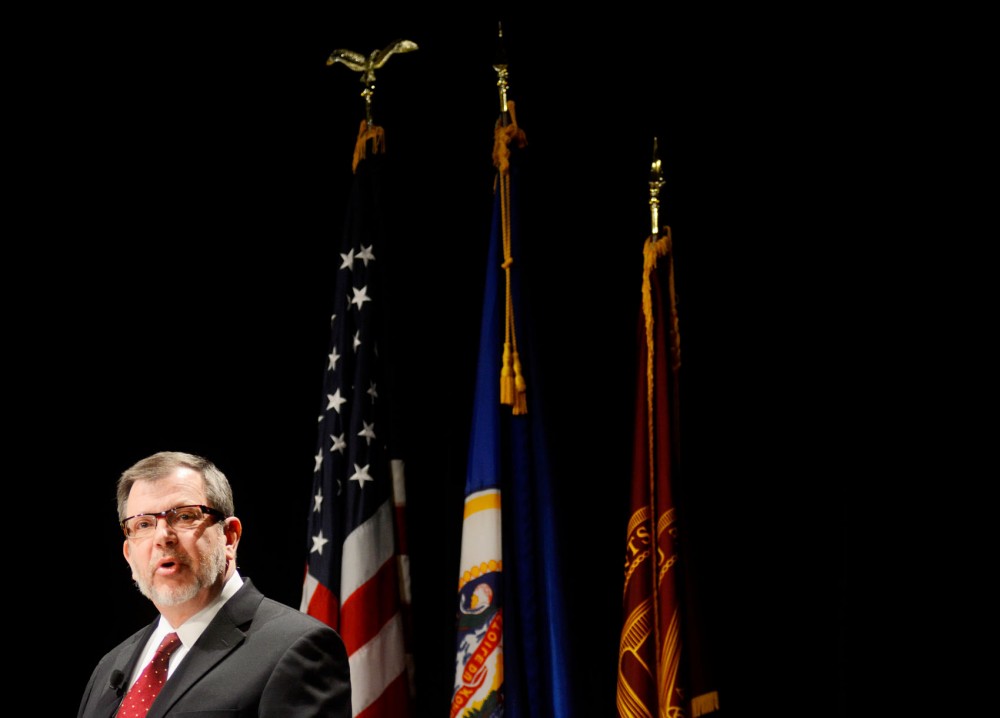In his third State of the University address last week, University of Minnesota President Eric Kaler outlined a long list of challenges the institution will tackle in the coming year.
Kaler laid out plans to up diversity, degree options and the University’s partnership with the city, but some students question the plan’s feasibility.
Although some of these issues are long-running, Kaler assured the campus community that progress is being made.
“Change may feel slow here, but we have picked up the pace,” he said to a crowd of about 300 students, faculty and staff at Coffman Union.
To address society’s “grand challenges” like poverty, climate change and other world issues, Kaler said the Twin Cities campus will add new majors and minors that will focus on confronting real-world problems. He said it’s too soon to say specifically what new programs will be added.
Board of Regents Chair Richard Beeson said bringing more attention to these issues will strengthen the University’s global ties.
“I’m really drawn to the theme of grand challenges in a diverse and changing world,” he said. “Taking ownership of the issue is, I think, inspiring.”
One of the largest challenges within the University is affordability, Kaler said.
To boost the University’s investment in graduate students, he announced that next year’s budget will include an additional $2 million for doctoral dissertation fellowships.
Still, some are critical of the president’s goals. At a meeting held by Students for a Democratic Society after the address Thursday, students said that University leaders should consider the concerns of the whole campus community when setting the institution’s priorities.
“I feel like that’s something we’re missing here,” SDS member Nick Theis said, “and I think that’s where students need to step in, because our student voices need to matter.”
Redoubling diversity efforts
Kaler said Thursday that the University’s record of attracting and retaining students of color, specifically black males, has been “poor.”
Vice President for Equity and Diversity Katrice Albert expressed similar sentiments at last month’s Board of Regents meeting. Currently, black students make up about 4 percent of the Twin Cities campus population.
To address these issues, Kaler said the University’s Office for Equity and Diversity and Office of Admissions will work in the coming year to increase diversity at campuses system-wide.
“We need to redouble outreach to these students and showcase academic opportunity,” he said in his address.
Minnesota Student Association ranking representative to the Board of Regents Joelle Stangler said she appreciated the president’s emphasis on building a diverse University, because some students of color may currently feel closed off from the campus community.
“It’s something that I think a lot of different groups at the University campus struggle with,” she said.
But some in SDS said Albert’s and Kaler’s recent discussions about building a diverse campus aren’t feasible.
“We’ll see if [Albert’s] money’s where her mouth is,” Theis said.
SDS hosted the meeting alongside other student groups to give students an opportunity to discuss issues important to them. About 30 students attended.
Theis said the recent contention over including suspects’ race in University crime alerts doesn’t help the institution’s efforts to attract more black students.
“Those things don’t make it look like a friendly place,” he said.
In his speech, Kaler said the University recently created a workgroup made up of senior leaders to create a plan to improve the campus climate.
Development and beyond
Kaler also discussed the recent boom in housing near campus and said the University is re-evaluating its partnership with the city of Minneapolis to ensure the institution’s voice is heard in development decisions.
“For too long, we at the University have seemed not to care about development surrounding our Minneapolis campus,” he said in his address.
The recent development brought in many new people to the area, he said, which could have played a part in the uptick in on- and off-campus crime this year.
He said the University will work with the city to ensure the area meets students’ needs.
The University will create a “set of guiding principles” this semester to work with the city and campus-area neighborhoods, he said, and the plan will be presented to the Board of Regents in June.
Kaler also reviewed the University’s accomplishments from previous years in his speech, noting the two-year undergraduate tuition freeze, a program to boost scientific research and his plan to significantly cut administrative costs in the next five years.
“I want this University to have a grand ambition and apply that against our many grand challenges,” Kaler said to the crowd. “Let’s do that work together.”


